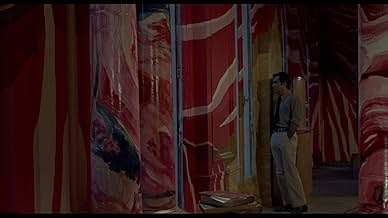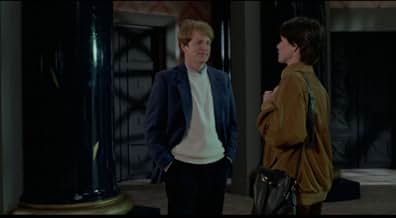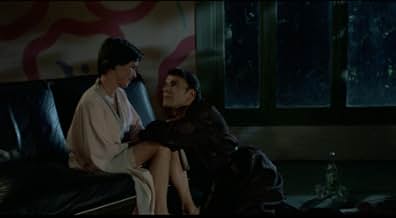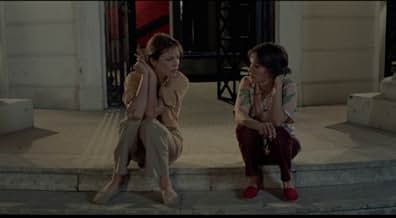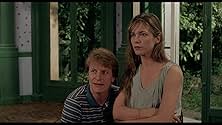Un auteur excentrique fait appel à deux comédiennes pour répéter et jouer une de ses pièces chez lui. D'abord hésitantes, les deux femmes acceptent.Un auteur excentrique fait appel à deux comédiennes pour répéter et jouer une de ses pièces chez lui. D'abord hésitantes, les deux femmes acceptent.Un auteur excentrique fait appel à deux comédiennes pour répéter et jouer une de ses pièces chez lui. D'abord hésitantes, les deux femmes acceptent.
- Réalisation
- Scénario
- Casting principal
- Récompenses
- 1 nomination au total
Avis à la une
My review was written in October 1984 after a New York Film Festival screening.
Jacques Rivette's "Love on the Ground" is a gamesplaying effort that unfortunately misses its opportunities for flights of fancy, remaining an Earthbound exercise. Rivette's loyal local following and the potent box office lure of stars Jane Birkin and Geraldine Chaplin augur good results in film's French release, but U. S. distribution by Spectrafilm faces an uphill battle.
A promising opening introduces three actors (Birkin, Chaplin and Facundo Bo) performing a Sunday night play in the rooms and corridors of their apartment. Among the casual spectators, who lurk just beyond the action (immediately setting up Rivette's usual duality between what is theater and what is "real" in his film) is a playwright Clement (Jean-Pierre Kalfon) whose work is being mangled by the trio. Instead of suing them, he hires them to enact a new playh at his mansion the following Saturday, one performance only., with the fourth act to be delivered at the last moment. The two women also are invited to move into the mansion for rehearsals, and they accept.
What unfolds is a weak satire of gothic melodramas, loaded with portentous dialog and saddled with numerous rehearsal scenes of a boring play. Rivette's gimmick is to have the play be autobiographical, concerning Clement's triangular love affair with Beatrice (since disappeared) and Pual (Andre Dussolier), latter a nightclub magician who, a la Tyrone Power in "Nightmare Alley", has gone beyond tricks into truly supernatural actions. He is also at the mansion, exerting his powers ove the two actresses, who briefly hallucinate future events involving themselves.
Rivette is working in familiar territory, not only from his previous films such as "L'amour fou" and "Celina and Julie Go Boating" but elated other works by former collaborators such as Eduardo de Gregorio's "Serail". The main problem is that his characters remain mere puppets in an elaborate, contrived game holding little intrinsic interest. Having the characters manipulate each other doesn't work since the plot changes are largely arbitrary, exemplified by an unconvincing, strictly functional, violent fight between Birkin and Chaplin midway through the film.
In place of fantasy, the film relies on well-disguised cuts to create the illusion of Chaplin and Birkin seeing themselves in their hallucinations; a mysterious room upstairs which emits sound effects of the sea, birds and orchestra tuning up (about as exciting as someone playing a sound effects record) and arresting pastel painted sets at the mansion.
Within a tongue-in-cheek format poking light fun at all the role-players, Chaplin and Birkin acquit themselves well though they're a bit too old for their parts. Kalfon is suitably sinister and Laszlo Szabo contributes several funny scenes as the unctuous "pussycat" of a butler/handyman working for Kalfon. Sandra Montaigu (star of "Lucie sur Seine") has some sharp verbal exchanges as the current, disgruntled woman of the house.
Pat ending, in which many details are tied up neatly and characters indulge in a series of one-upmanship games regarding the play's finale, is self-destructive, leading the viewer to wonder: is that all this was about? Obviously, Rivette is continuing his examination of theatrical devices but that was done far better in the serious context of his best film, "L'amour fou".
Jacques Rivette's "Love on the Ground" is a gamesplaying effort that unfortunately misses its opportunities for flights of fancy, remaining an Earthbound exercise. Rivette's loyal local following and the potent box office lure of stars Jane Birkin and Geraldine Chaplin augur good results in film's French release, but U. S. distribution by Spectrafilm faces an uphill battle.
A promising opening introduces three actors (Birkin, Chaplin and Facundo Bo) performing a Sunday night play in the rooms and corridors of their apartment. Among the casual spectators, who lurk just beyond the action (immediately setting up Rivette's usual duality between what is theater and what is "real" in his film) is a playwright Clement (Jean-Pierre Kalfon) whose work is being mangled by the trio. Instead of suing them, he hires them to enact a new playh at his mansion the following Saturday, one performance only., with the fourth act to be delivered at the last moment. The two women also are invited to move into the mansion for rehearsals, and they accept.
What unfolds is a weak satire of gothic melodramas, loaded with portentous dialog and saddled with numerous rehearsal scenes of a boring play. Rivette's gimmick is to have the play be autobiographical, concerning Clement's triangular love affair with Beatrice (since disappeared) and Pual (Andre Dussolier), latter a nightclub magician who, a la Tyrone Power in "Nightmare Alley", has gone beyond tricks into truly supernatural actions. He is also at the mansion, exerting his powers ove the two actresses, who briefly hallucinate future events involving themselves.
Rivette is working in familiar territory, not only from his previous films such as "L'amour fou" and "Celina and Julie Go Boating" but elated other works by former collaborators such as Eduardo de Gregorio's "Serail". The main problem is that his characters remain mere puppets in an elaborate, contrived game holding little intrinsic interest. Having the characters manipulate each other doesn't work since the plot changes are largely arbitrary, exemplified by an unconvincing, strictly functional, violent fight between Birkin and Chaplin midway through the film.
In place of fantasy, the film relies on well-disguised cuts to create the illusion of Chaplin and Birkin seeing themselves in their hallucinations; a mysterious room upstairs which emits sound effects of the sea, birds and orchestra tuning up (about as exciting as someone playing a sound effects record) and arresting pastel painted sets at the mansion.
Within a tongue-in-cheek format poking light fun at all the role-players, Chaplin and Birkin acquit themselves well though they're a bit too old for their parts. Kalfon is suitably sinister and Laszlo Szabo contributes several funny scenes as the unctuous "pussycat" of a butler/handyman working for Kalfon. Sandra Montaigu (star of "Lucie sur Seine") has some sharp verbal exchanges as the current, disgruntled woman of the house.
Pat ending, in which many details are tied up neatly and characters indulge in a series of one-upmanship games regarding the play's finale, is self-destructive, leading the viewer to wonder: is that all this was about? Obviously, Rivette is continuing his examination of theatrical devices but that was done far better in the serious context of his best film, "L'amour fou".
There are reasons that Rivette is the least known of the New Wave directors..
For some this will feel like a slow drag (the director's cut is running 169mn long), but a few others will enjoy the blend of theatre and life itself that turns into one big messy, ecstatic stew, bubbling over with emotions, both performed and deeply felt.
If you ever feel tired of the noise, the speed, the clutter of modern cinema, take a nice long (in this case, 169 minutes long - in the Director's Cut) break from all of it with a Jacques Rivette film; it's an experience like no other. As far from "art for art's sake" as it is from the mainstream, "Love On The Ground" is simultaneously very simple and very complicated: it's about the artistic process, the way life influences art (and vice versa), the quest for love, random human encounters (in the metro, in a bar), and magical visions of the future! It's not for every taste or mood, but if you are in the right mood (I was), you'll probably find it refreshingly unhurried and thoroughly absorbing. *** out of 4.
Most films narrow us down, make as if reality is some solid, fixed, particular thing. I don't perceive it in any such dogmatic way in real life and what I'm after in the cinema is filmmakers who can show it to be fluid and empty of a particular reality, currents of colored air. Baudelaire spoke of the flaneur who walks the city in order to experience himself in the center of the multitude of possible views. Further back it was Taoists who talked about being able to wander far and wide, freely entering each thing without being fettered by its particularity.
With Rivette, as with Resnais before and Lynch after, it comes down to fictions within fictions, selves within selves or as other selves who hover in and out of experiencing themselves at the center of fictions. Possible views where no single one alone is real but they all make each other possible.
Everything with these makers often doubletimes as self-referential; obvious here, about actresses coming to a villa to rehearse a play at the behest of the author, coming and going from enactments of trysts and dalliances as part of the play to actual affairs taking shape outside the fiction in the same house.
But - as with Hiroshima mon amour and Mulholland Drive - it's the broader view that entices me with something like this, that it can chart that liberating path where reality is neither fixed nor on the other hand random, a surreal flight of fancy, but something is giving rise to its dreams and in turn inhabiting those dreams as itself. Rivette had done it before in Celine and Julie, he bestows us the gift of free wandering again here.
It's marvelous to be able to walk freely to find ourselves at the center of what he has prepared.
The main reality here is someone wondering about love, perhaps after a betrayal. It may be that only Geraldine or the woman- inside-the- play's character is real (but that doesn't mean anyone is imaginary in the sense of Tyler Durden where we know he is).
It begins with the two women discovering each other as mistresses of the same man, but instead of something that irrevocably happened in any one reality, we get it as the last scene of a play that unfolds inside an apartment, with the audience snooping after the actors in full view of the fiction taking shape.
Two actresses; one brash and free- spirited, the other reserved and romantic, both - like Celine and Julie - different facets of a self that dreams herself as either, both complicit in the effort to make sense out of some mystery concealed in the fictional play that requires their participation to come alive.
They fall for two men; both illusionists (playwright - stage magician) used to being in deceiving control of appearances, both were in love with the same woman who disappeared one night and the play, we find out, is about events of that night in the same house, disguised memory that needs a woman to come alive.
So as it comes alive in this house, all sorts of spontaneously arising views blossoms, not all of them as planned within confines of that story. Selves are swapped, Jane ends up playing the character of Paul the magician while being courted by him outside the play. Omens abound, premonitions of mystery; a hallucinated scene of murder, a mysterious dark room with boarded windows where one of the men sits alone in a chair.
Eventually, having persisted in the fictional remembered world where a woman (an inner woman wondering about love) is courted by those two, both are shown to be deceiving. It comes around with the last scene of this play with an audience in full view; but now the woman- within makes an appearance, summoned by the fiction to be chased off, the girls saving her for her own good. The premonition of death conspires to happen but, unlike the dream, no one really dies.
We get to freely inhabit without knowing; dreams, affairs, overlapping layers of illusion that can only come to life because actors comply to participate, and all this as a woman wandering through her own place in unfathomable emotions that were set in motion long ago. Eventually the fiction is shown to be empty. The women go out laughing. The statue of Cupid that she broke to pieces one night is magically put together and standing in its place.
To my mind, this is a milestone on the path from Lady of Shanghai to Mulholland Drive and that makes it indispensable wisdom.
Something to meditate upon
With Rivette, as with Resnais before and Lynch after, it comes down to fictions within fictions, selves within selves or as other selves who hover in and out of experiencing themselves at the center of fictions. Possible views where no single one alone is real but they all make each other possible.
Everything with these makers often doubletimes as self-referential; obvious here, about actresses coming to a villa to rehearse a play at the behest of the author, coming and going from enactments of trysts and dalliances as part of the play to actual affairs taking shape outside the fiction in the same house.
But - as with Hiroshima mon amour and Mulholland Drive - it's the broader view that entices me with something like this, that it can chart that liberating path where reality is neither fixed nor on the other hand random, a surreal flight of fancy, but something is giving rise to its dreams and in turn inhabiting those dreams as itself. Rivette had done it before in Celine and Julie, he bestows us the gift of free wandering again here.
It's marvelous to be able to walk freely to find ourselves at the center of what he has prepared.
The main reality here is someone wondering about love, perhaps after a betrayal. It may be that only Geraldine or the woman- inside-the- play's character is real (but that doesn't mean anyone is imaginary in the sense of Tyler Durden where we know he is).
It begins with the two women discovering each other as mistresses of the same man, but instead of something that irrevocably happened in any one reality, we get it as the last scene of a play that unfolds inside an apartment, with the audience snooping after the actors in full view of the fiction taking shape.
Two actresses; one brash and free- spirited, the other reserved and romantic, both - like Celine and Julie - different facets of a self that dreams herself as either, both complicit in the effort to make sense out of some mystery concealed in the fictional play that requires their participation to come alive.
They fall for two men; both illusionists (playwright - stage magician) used to being in deceiving control of appearances, both were in love with the same woman who disappeared one night and the play, we find out, is about events of that night in the same house, disguised memory that needs a woman to come alive.
So as it comes alive in this house, all sorts of spontaneously arising views blossoms, not all of them as planned within confines of that story. Selves are swapped, Jane ends up playing the character of Paul the magician while being courted by him outside the play. Omens abound, premonitions of mystery; a hallucinated scene of murder, a mysterious dark room with boarded windows where one of the men sits alone in a chair.
Eventually, having persisted in the fictional remembered world where a woman (an inner woman wondering about love) is courted by those two, both are shown to be deceiving. It comes around with the last scene of this play with an audience in full view; but now the woman- within makes an appearance, summoned by the fiction to be chased off, the girls saving her for her own good. The premonition of death conspires to happen but, unlike the dream, no one really dies.
We get to freely inhabit without knowing; dreams, affairs, overlapping layers of illusion that can only come to life because actors comply to participate, and all this as a woman wandering through her own place in unfathomable emotions that were set in motion long ago. Eventually the fiction is shown to be empty. The women go out laughing. The statue of Cupid that she broke to pieces one night is magically put together and standing in its place.
To my mind, this is a milestone on the path from Lady of Shanghai to Mulholland Drive and that makes it indispensable wisdom.
Something to meditate upon
Stars two larger than life actors. Jane birkin, as in the "birkin bag" and geraldine chaplin, daughter of charlie chaplin. As the description says, it's a play, within a play. Within a play. Confusing. This one is quite ethereal. Not quite sure what's going on, pretty hard to follow. Even more so with the subtitles, as it's in french. And most of the reviewers don't seem to know what's really going on either, so I'm not alone. The audience is invited into the house of the people living their lives. Directed by jacques rivette. He has won numerous film fest awards. Some similarities to "synecdoche new york" from 2008, where phillip hoffman hires people to make a real time play about his own life. That one has a more cohesive plot... the lead is slowly losing track of reality, and it gets more and more confusing as the actors try to keep up with with the lead, who is coming undone. They are both hard to follow. For those with the patience.
Le saviez-vous
- AnecdotesThe 2 main characters are called Emily and Charlotte. This is probably a reference to the Brontë sisters, especially in view of the fact that the following film by Rivette was Wuthering Heights (Hurlevent).
- Versions alternativesThere is also a 2 hour and 48 minute version.
- ConnexionsReferences Nashville (1975)
Meilleurs choix
Connectez-vous pour évaluer et suivre la liste de favoris afin de recevoir des recommandations personnalisées
- How long is Love on the Ground?Alimenté par Alexa
Détails
- Durée
- 2h 5min(125 min)
- Mixage
Contribuer à cette page
Suggérer une modification ou ajouter du contenu manquant


